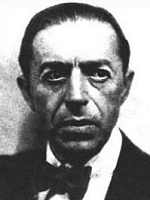Soviet secret police tricked British spy into a trap 80 years ago
Reilly spent 40 days in a Moscow prison. Within the period, Great Britain took almost no measures to release its citizen
November 5, 1925 is a memorable day for the national special services: this day British spy and adventurer Sidney Reilly ended his career. After the well-known “plot of ambassadors” failed in the Soviet Union in 1918, Sidney Reilly was outlawed, in other words he was sentenced to death sentence. But the spy managed to escape. It was just in seven years that Stalin's secret police OGPU officers managed to trick him into the Soviet Union and arrested. Historian Igor Pykhalov from St.Petersburg tells unknown details of the operation. 
It is highly probable that Sidney Reilly was born March 24, 1874 in the Ukrainian city of Kherson while it is usually believed he was born in Odessa. His real name was Sigmund Rosenblum. His father Mark Rosenblum was a broker and afterwards worked as a ship agent. The name of the mother is unknown; she was a Russified Pole. The well-off family moved to Odessa soon after the future spy was born.
Reilly was a subject of the British crown and served in the MI-6 intelligence service. Even though Reilly wanted to be recognized by the British elite, the society still treated him cautiously. Being very ambitious, Reilly often embellished his biography. Some researchers state that he spoke seven languages, but in fact he spoke fluently only Russian and English and probably knew some German.
After a year of studied at the University of Novorossiisk, Sigmund Rosenblum left for London to continue studies. Then he married Irish Reilly Callaghan and took her first name as his last name because of its euphony.
A special operation The Trust was launched in the USSR to trick the British spy into returning to the Soviet Union. Leaders of the white emigration Baron Vrangel and General Kutepov, even though they lost the Civil War, still could not admit that majority of the Russian population supported Bolsheviks. They believed that some influential organization was working in the USSR to organize a coup d'etat.
In 1925, Reilly was in New York where he performed some commercial combinations. As soon as he learnt about The Trust, he immediately rushed into the trap that Bolsheviks laid out for him. First of all, he hated Bolsheviks and emphasized several times that overthrowing of the Soviet regime was the main goal of his life.
However, there were some other reasons. In 1921, Sidney Reilly assisted Boris Savinkov in organizing armed raids upon the territories of Belarus and Ukraine. Simultaneously, anti- revolts were expected to break out there and Reilly was to inform the MI-6 leaders about them. But in fact, secret police officers managed to arrest the plotters and no revolts took place. That suggested to the British intelligence that Reilly was probably a double agent. And the spy himself believed that The Trust would rehabilitate him in the opinion of his bosses.
What is more, together with espionage Reilly also ran some business. But in 1925 his business was no success. Sidney Reilly wanted to find some money to “continue fighting the Bolshevik regime” and also put some of this money into his own pocket. At that period, the West was establishing economic contacts with Bolsheviks.
To learn more about activity of The Trust, Sidney Reilly crossed the Soviet-Finnish border. He believed there was no real danger for him in the USSR if The Trust was a really powerful organization. He thought the OGPU would all the same let him go if The Trust was just a hoax of the secret police.
When Sidney was detained, the OGPU leaders could not decide whether to arrest or to release him. After long debates it was decided to arrest the British spy, but no official statement of the arrest was made. The OGPU did not want to make the arrest public as it was believed that The Trust could be used in the future for other purposes. At the same time, there was also no official report about Reilly's death. Probably, the OGPU gave Reilly a chance to get out from Russia alive. But to remain alive, the OGPU wanted Sidney Reilly inform the Soviet secret police about western special services agents working in the USSR and also act an informal intermediary between the Soviet Government and western corporations. Reilly accepted the conditions and wrote a letter to Dzerzhinsky on October 30 to confirm his consent. But some sources state that Stalin insisted that the death sentence passed on Reilly in 1918 must be executed.
Reilly spent 40 days in a Moscow prison. Within the period, Great Britain took almost no measures to release its citizen. British officials emphasized that it was Reilly's personal decision to go to the USSR and the authority was no longer responsible for his future.
Discuss this article on Pravda.Ru FORUM
Subscribe to Pravda.Ru Telegram channel, Facebook, RSS!




